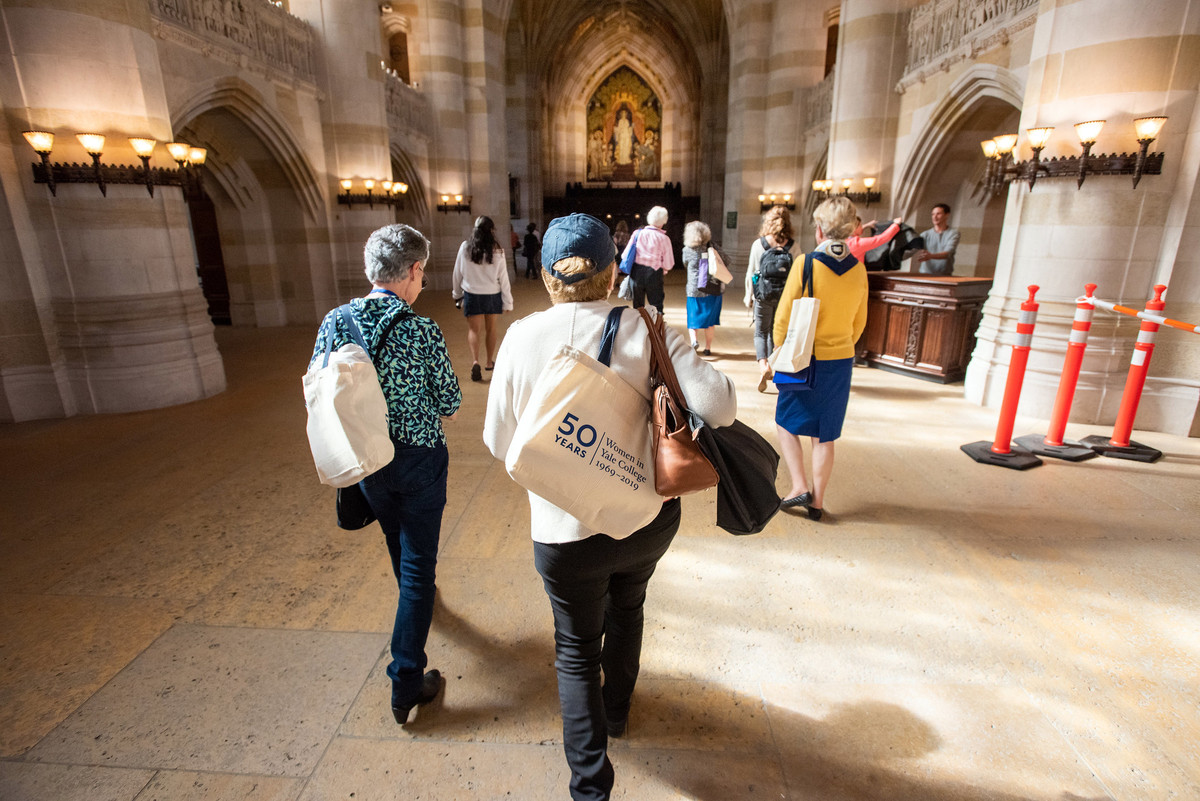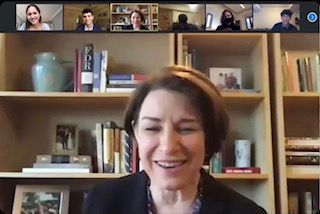
Courtesy of Mara Lavitt
This weekend, a historic series of webcasts concluded the yearlong 50WomenAtYale150 initiative, a program launched to celebrate 150 years since women were first admitted into Yale University and 50 years since the beginning of undergraduate co-education at Yale College.
The commemorations, originally intended to be held at the Schwarzman Center, were livestreamed between Sept. 24 and Sept. 27. They featured Yale alumni hailing from a vast diversity of backgrounds, fields and experiences. Among the invited speakers were former Secretary of State Hillary Rodham Clinton LAW ’73, Academy Award winner Jodie Foster ’85 and United Nations High Commissioner for Refugees Goodwill Ambassador and poet Emi Mahmoud ’16. Discussions centered on topics such as social justice, threats to democracy and the climate crisis, spotlighting the voices of the many Yale female trailblazers who are shaping their fields and promoting important conversations on some of the world’s greatest problems.
“If you were on campus before the pandemic, you saw the banners, buttons, signs and posters honoring the contributions of women of Yale throughout the year,” said Regina Bain ’98 DRA ’01 in her introduction to the webinar’s first session. “And when the pandemic turned the world upside down, the celebrations moved online, culminating in [this] historic symposium.”
According to the event’s organizers, the aim of the webinars was to galvanize younger generations into action and encourage them to follow in the footsteps of Yale women who are leaving their mark on the world.

In her welcome speech for the first session, Foster reminisced on her arrival at Yale and discussed grappling with impostor syndrome –– “a hallmark of elite universities,” she said –– during her first year. She described not having felt “smart enough, deep enough, preppy enough, you name it enough, to belong there.”
She spoke about growing more comfortable during her second year and how that feeling eventually allowed her to perceive that Yale had its own share of problems –– a realization that represented, to her, the point “where the real education begins, when you finally bring that strength of self to challenge these hallowed walls from the inside, and claim ownership of your education.”
Foster also spoke of the first undergraduate women to walk through the gates of Old Campus in 1969, igniting a period of transformation.
“That very act was an earthquake,” Foster said. “It was the beginning of a new era, and it said, let it be known, this place will grow and change.”
In his opening address, alongside his wife Marta Moret SPH ’84, University President Peter Salovey remembered those who led co-education efforts over a century ago and “set the stage for our work today, to increase the representation of women in faculty positions and in leadership roles across all sectors.” According to Salovey, those people were the ones to teach the community how to engage in more profound conversations about inclusion, diversity and belonging for all.
After the opening speeches, the first panel of the webinar series, “The Quest for a Just World,” began, moderated by Sheryl Carter Negash ’82, manager of the Negash and Associates LLC consulting firm and 2018 awardee of the Yale Medal –– the alumni association’s highest award for service to the University. In this discussion, speakers — including psychologist Cheryl Grills ’80 and Chair and Commissioner of the New York City Commission on Human Rights Carmelyn Malalis ’96 — discussed the need for systemic reforms across America to combat racial and social injustice.
“Government, for such a long time, historically, at every level … has really feared attacking the root causes of racial discrimination,” Malalis said.
Alluding to her experiences in government, Malalis commented on what it felt like for her to observe how much fear of disturbing the status quo exists in government. Echoing that sentiment, Grills pointed out that the time has come for a reckoning with the United States’ problematic past.
“For generations, America has taught its children, and reified in its movies and books, a glorious myth about the origins of this country and its greatness,” Grills said, “ignoring that it lied, it stole, it killed, it trafficked human bodies and souls, it enslaved, it colonized, it terrorized, it disenfranchised and it committed genocide against Black, Indigenous and other people of color.”
The second panel, “Art Now”, focused on discussions of the legacy of Yale women in the arts and how they are dealing with difficulties posed by the pandemic for the field.
“Especially after this period, if it will ever be over, I think we are going to need more connection than ever,” Tanya Bannister MUS ’01. “I just can’t wait to see what the world is going to be like as we come out of this and what we can do as women and as art leaders.”
Beginning conversations for this second panel centered on disability and equity at Yale and beyond with national disability rights advocate Janni Lehrer-Stein ’78. It finished with a discussion on “Making Change When Change is Hard” with former U.S. Ambassador to the United Nations Samantha Power ’92 and Wazhma Sadat ’14 LAW ’19, the first Afghan woman to graduate from Yale Law School.
When speaking to the challenges faced by the world at the moment, Power commented on how this moment in time has pushed people toward causes that deserve attention.
“It makes many of us feel very small, and I think that’s the biggest challenge,” Power said. “How do you get the gumption to believe that you can make a difference when problems feel as big as pandemics or as great recessions or as systemic racial injustice.”
On Friday, the first session was called “Saving Democracy” and was introduced by a conversation with former presidential candidates Clinton and Sen. Amy Klobuchar ’82. The discussion, moderated by Director of the Afro-American Cultural Center at Yale and Assistant Dean of Yale College Risë Nelson, explored what it is like to run for president of the United States as a woman. The panel revolved around conversations that unpacked the American landscape of political polarization and explored why more women should be running for office.
Clinton spoke at length about her advice for those who are disheartened by modern-day politics.
“You can’t ever lose hope,” Clinton said. “You have to be willing to keep going, despite the setbacks, and you have to be willing to participate in our democracy to literally save it, and [to vote] for people who will agree with you to make the changes that are so long overdue and necessary.”
The Friday and Saturday sessions zoomed in on inequality in America, climate change and women using their voices in the media and journalism.
For the final Sunday session, a retrospective view of the evolution of women in Yale College over the past 50 years marked the end of the webcast series. Yale alumnae who later went on to teach at the University drove the conversation, speaking to their experiences as undergraduate students, changes that have molded Yale into what it is today and the ground left to cover in including more women in the University’s intellectual life.
Recordings of the webcast sessions are available on demand via the registration website.
Maria Fernanda Pacheco | maria.pacheco@yale.edu








